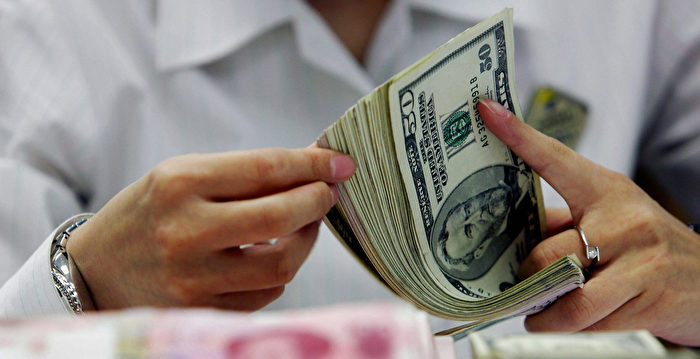[Epoch Times December 11, 2021](Epoch Times reporter Liu Yi comprehensive report) On December 10, the onshore, offshore, and central parity rates of the RMB against the US dollar fell.
After the Central Bank of the Communist Party of China announced on December 9 to increase the foreign exchange deposit reserve ratio of financial institutions by 2 percentage points to 9%, which took effect on the 15th, the exchange rate of RMB against the US dollar fell on the 9th. On the 10th, the RMB exchange rate against the US dollar fell across the board.
According to the website of the State Administration of Foreign Exchange of the Communist Party of China, on the 10th, the central parity rate of RMB, representing the official attitude of the Chinese Communist Party, reported 6.3702 yuan to 1 US dollar, down 204 points or 0.32% from 6.3498 on the 9th.
The onshore renminbi price closed at 6.3457 at 16:30 Beijing time during the day, down 247 points or 0.39%; at 23:29 in the evening, the renminbi night market closed at 6.3700, and on the 9th the renminbi night market closed at 6.3776.
The FOB price of RMB approached 6.39 in intraday trading on the 10th, and hit 6.3893 as low. As of 6 a.m. Beijing time on the 11th, the FOB price of RMB was reported at 6.3771 and closed at 6.3764 on the 9th.
Regarding the devaluation of the renminbi, Reuters quoted a trader’s analysis that after the Central Bank of the Communist Party of China raised the foreign exchange reserve ratio on the evening of the 9th, the central parity rate of the renminbi on the 10th was significantly weaker than expected, indicating that the supervisory authorities have released strong policies for the rise of the renminbi. Signals, the short-term renminbi trend is likely to fluctuate, but the demand for foreign exchange settlement from customers is still strong, and the effect of this increase in foreign exchange deposit standards may be worse than last time. If the rise of the renminbi is difficult to cool down, the regulators may offer more control measures.
The Hong Kong Economic Journal reported that some traders believed that the Chinese Communist Party’s supervisory authorities twice in a row raised the foreign exchange reserve ratio when the renminbi rose to around 6.35, sending a very clear policy signal that the 6.35 line is the bottom line of the policy.
CICC also believes that raising the foreign exchange deposit reserve ratio may make it clear that 6.35 is an important short-term point for the RMB exchange rate, and the RMB exchange rate may fall in the short-term due to policy influences. In the medium and long term, we will continue to maintain a moderate view of the depreciation of the RMB exchange rate.
Goldman Sachs believes that the increase in the foreign exchange deposit reserve ratio shows that the People’s Bank of China is uncomfortable with the strengthening of the renminbi. The rapid and continuous appreciation also increases the risk of herding effect and unilateral speculation. If market sentiment reverses, the weakening of the renminbi will bring greater risks.
The Hong Kong Economic Times quoted the analysis of Zhang Jiantai, chief Asian strategist at Mizuho Bank, as saying that the central bank’s move is surprising because the Federal Reserve has already planned to raise interest rates in the coming year, while the central bank still insists on raising the foreign exchange deposit reserve ratio, showing its stability in foreign exchange. The attitude of the market.
Gary Ng, an economist at the Bank of France in Hong Kong, believes that as the downward pressure on China’s economy increases, the excessive strength of the renminbi does not augur well for growth, especially in the first quarter of next year with a high base.
Li Liuyang, chief foreign exchange analyst of China Merchants Bank’s Financial Markets Department, believes that the RMB exchange rate has risen too sharply, and there is pressure for unilateral appreciation. If the effect is not good this time, more policies may be introduced later.
Since the end of July, the RMB exchange rate against the US dollar has risen by more than 2%. Calculated on a trade-weighted basis, it is at the highest level since the end of 2015.
Editor in charge: Ye Ziming
.
